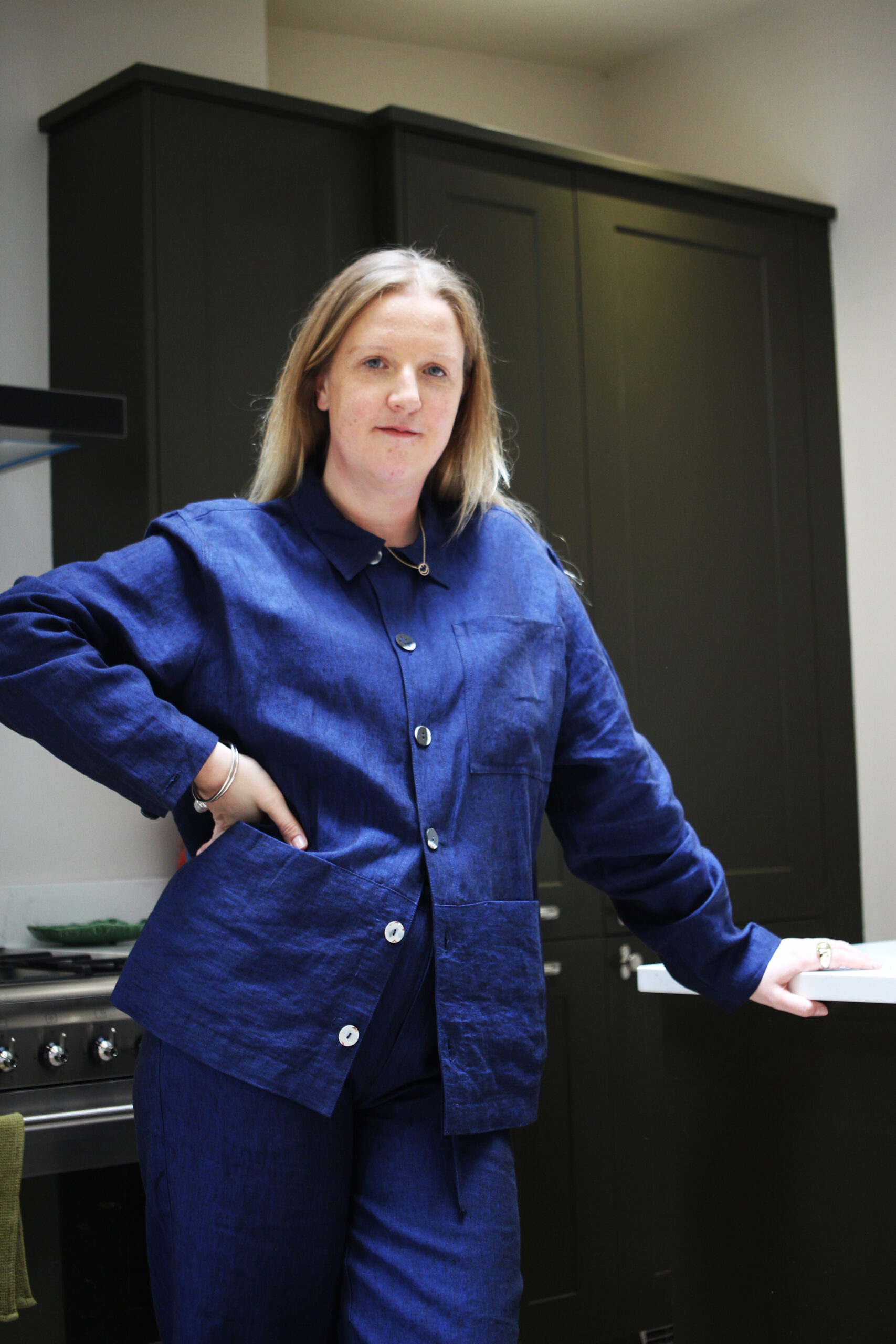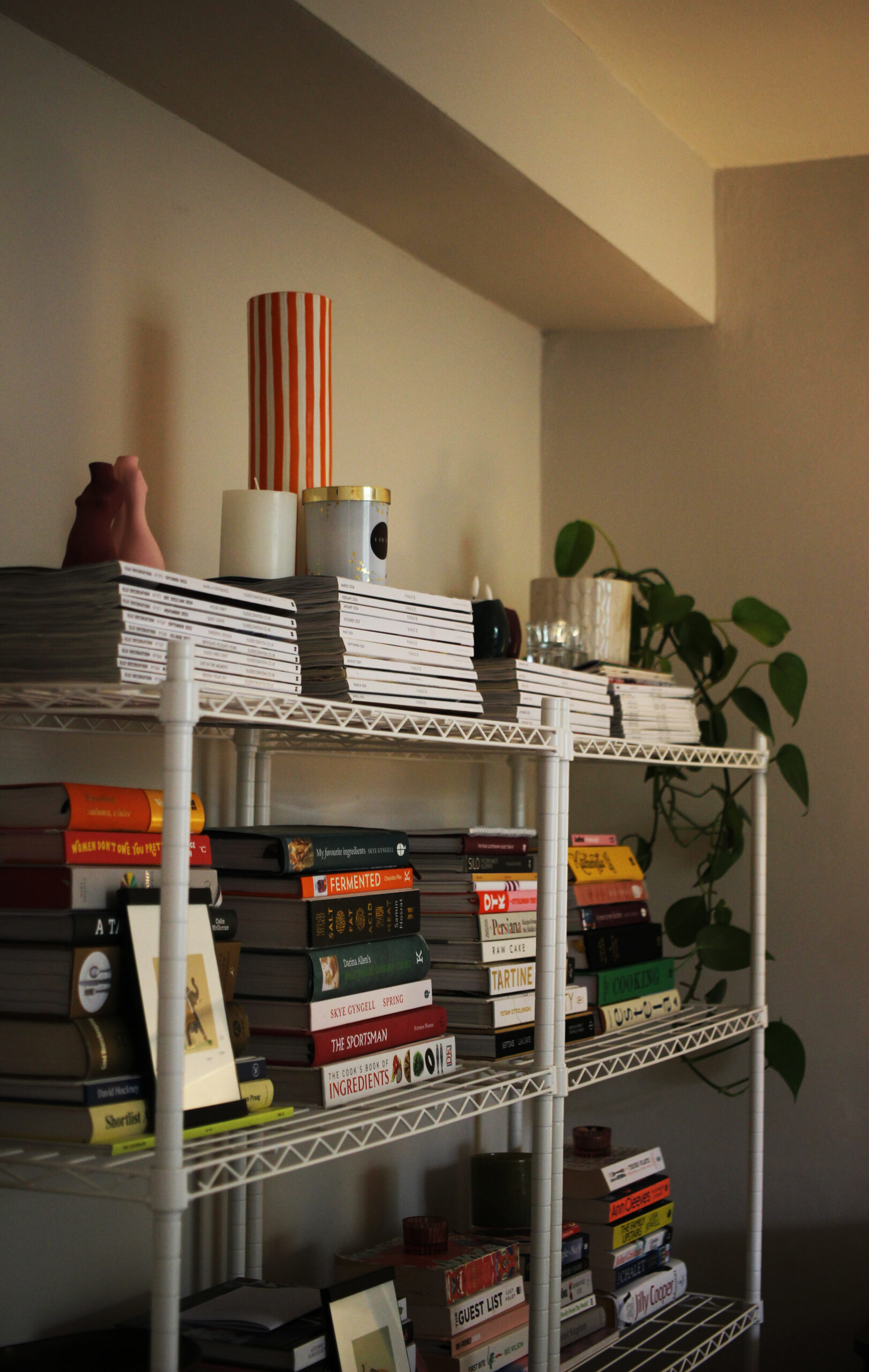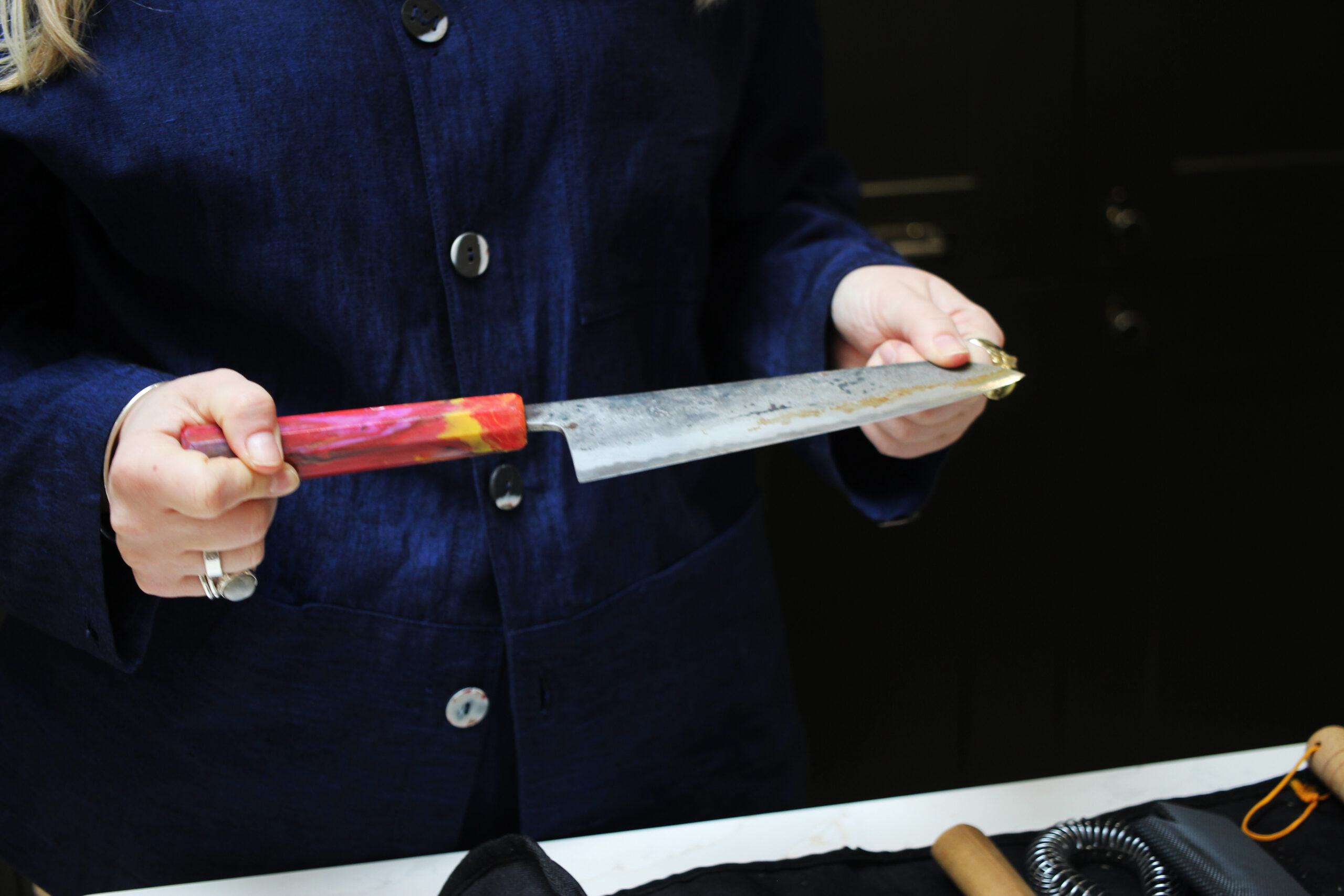Eleanor Henson, SpringAt home with Eleanor Henson, Head Chef at Spring

The second campaign from MISSING shines a light on London Chefs, kicking off with Eleanor Henson – Head Chef of Spring Restaurant at Somerset House.
We feel that there are real parallels between what chefs are doing and what we’re doing. We face many of the same challenges, especially post Brexit, and we want to celebrate these great London chefs and what they’re doing, share the challenges we’re facing and celebrate the care and craft that goes into our work. We are so excited by the people we have selected so far, the conversations have been so inspiring.
We were invited to talk with Eleanor Henson at her home in South London and talked through her journey, her must-haves and the importance of provenance.
Paul Missing (PM): There’s a synergy between what we do at MISSING and what chefs do, where it’s not just about an end product. You know where these things come from. Where does that begin for you?
Eleanor Henson (EH): I’m born and bred Lincolnshire, which is an amazing country with amazing produce, and that was very ingrained in the way that I was brought up. Respecting the crops and the process, knowing the farmers and the families. Knowing good ingredients were of importance.
So naturally, it’s in your DNA. I think growing up around the farming in Lincolnshire clearly created a baseline.
PM: And how did you get into the culinary world?
EH: I went to Durham University. Did archaeology, which is hardly relevant to what I do now. I sort of hated my degree, but I loved my friends, I loved Durham, so just enjoyed it. But halfway through my dad was like, what are you doing? What’s the point of this? And I then said, “Actually I think I really want to go to Ballymaloe, which is a cooking school in Ireland run by Davina Allen, an incredible woman. So, I left and went to Ballymaloe for three months.
Their teachings are very much rooted in the field to fork approach – farming the lettuce, then pick it, eat it, keep the cycle going. That approach really resonated with me, possibly due to my Lincolnshire roots, even though it wasn’t something that I was conscious of.
I think they could see I was willing to work and believed in the ethos, and they led me to Spring. I started working there and I loved it. I love the team, I love working with Skye (Gyngell) and I’ve been there ever since.
PM: Wow, so fluid and it makes such sense. So, your career path has been around some of the most inspiring women in the industry – how do you think that affects things?
EH: Hugely. There’s no doubt.
Davina was integral, the way she does things is so formidable and so much stems from my time there.
Skye is the most incredible boss and so inspiring for what I do as a chef. Every plate of food that I’ve cooked is based on her style of food and it’s very much her teachings and practises that I signed up for, and I’m so happy for that. She has this unrelenting drive and I think working with that is just amazing. If somebody loses perspective, she goes and ‘gets in the weeds’. She’s like “everyone stop. This is what we’re doing. Let’s figure out how to make it happen.
PM: How long have you been at Spring?
EH: I think I’ve been there for seven years now, it’s been so amazing, I really do love it. We have a few sister restaurants which I’ve cooked in and Skye does a lot of dinners and events that I’ve helped with, which has been incredible.


PM: Tell me about how provenance plays a part in your kitchen?
EH: It wasn’t something I looked for, it was quite serendipitous, but the link to provenance has really followed me through every step of my cooking career.
But because Spring was my first job in my first kitchen, I didn’t even know that that was a conscious thing. I just sort of assumed that that was the way everybody did things. I remember two years in, having a conversation along the lines of career progression and feeling like I needed to try another kitchen. And she was like, go and do it for a week. We’ll pay you, see what happens. And I came back and I was like, I don’t like it! The ingredients were just so awful and it really wasn’t deemed as important in that kitchen (at the time!). I didn’t know that connection was what was speaking to me. So I came back and was like “no, please keep me!” So it’s sort of been a bit of a journey, but I feel like I’ve ended up in the best place I could without knowing.
Provenance for me is having a producer that has a very open and honest relationship with what they’re doing, but it comes with having a respect for the product – you have to understand what you’re working with, or you’ll just waste it.
At Spring we work with a biodynamic farm in Wales, and that has been so important for my understanding, knowing what you’re working with, and when to expect that ingredient. It’s a huge part of how we work. We are fully seasonal and we feel the weight of the products on each season. Berries come and we have an agreement with the supplier that we take 100% of the produce that they grow. It’s a very old-fashioned way of living, but we love it. It’s how we used to do things, you know?
We cook in a very simple way at Spring. We’re a plastic free kitchen, we make our own butter. We make bread. We make up some cheeses. And it all comes down to the fact that we are respecting the ingredients that are coming in, getting every last drop out of them. So, we are purposely making jam – the oranges here are left over from summer and I’m going to make marmalade because it’s in season.
PM: And how do you feel about the graft?? Is it core to a kitchen?
EH: It’s similar to art, isn’t it? You’re not always just born a draughtsman. It’s one hell of a skill and it really needs honing and if you understand the skills required, and the ‘basics’ as such, you will naturally be more fluent and more appreciative of different styles. So for a chef, you learn how to cook the fish. You learn the basics, the science, the maths, the essentials and the principles. That’s the foundation for your skill and creativity. And then you can dissect it and then you can break it down.
Because if you don’t have that original skill then it goes all over the ******* place – excuse me.
PM: Excused. And I agree ENTIRELY. I come from the art world, so this was a perfect coincidence. And I love the work you have up – do you have a favourite, or a favourite medium??
EH: I love how artwork can transform a space. I’m not sure I’m an expert, but I know what I like, and I really love photography. I love how it can transport you somewhere, anywhere really.


PM: Couldn’t agree more. I could digress for a while here, so I’ll get back on track. How do we safeguard the independents?
EH: I think a huge part of it is about clear communication with suppliers and producers. Ensuring a great relationship you can both rely on. Knowing the produce that is coming, being honest about the harvest and then you’re able to plan accordingly.
It’s also about educating the customer to understand every component of what’s on their plate – even the cost of the plate! And that’s not even accounting for the skill in the kitchen and the team.
And we find a way to use it, and that’s sort of my security for the producer. Here’s an example – we’re very lucky to have the space for this, but with one producer we were after 10 kilos of their produce and then we actually got 100 kilos of mine. It will probably last us for another six months now, but we can use it and get creative in the kitchen making delicious sauces, marinades and preserves. We’re sitting on strong ingredients and we value our suppliers, so it’s an opportunity to make the most of that produce. That approach takes work, and it’s hard work at times, but that’s OK, you know it’s worth it.
I think accessibility deserves a mention too, it’s a bit of an age-old restaurant problem. Expensive restaurants bring in a certain audience and whilst we love being able to provide our offering, we’re very conscious that we want to create all kinds of possibilities, so we provide different tasting options to encourage a wider offering that explores all kinds of ingredients and cuisines, showing off what you can do with ingredients at every stage. Good food shouldn’t just be for the rich. Understanding ingredients is important for all.
PM: I agree, I think education and communication are so important to getting people to understand and appreciate everything, really. On that, educate me – What couldn’t you survive without in the kitchen? What do I need around to up my game?
EH: Well, I have a particularly lovely knife. I have a lot of Japanese knives because they’re so good, but I love this because it’s a recycled plastic handle, which is so nice, and it was a present from my brother which makes it even more special. But I do think that people who can’t cook have bad knives, so I would recommend getting better knives if you want to elevate your kitchen skills.
A nice olive oil that makes everything taste so much better. I will happily cook some shop made pasta and just cover it in the lovely oil, it really makes the difference.
And my pestle and mortar. It feels a bit boring, but I use it every day, it really is an essential. I grind up all my slightly wilted herbs and spices and create lovely sauces to elevate things and then nothing needs throwing away. Add the olive oil into the mix and it’s such a great mix.



PM: That’s invaluable, and so interesting – I agree about the oil, it really does change things. I’m getting my pestle and mortar out later, so inspired now! One last thing, what do you like about MISSING?
EH: I love these pieces, I think there feels like there’s an elegance – I think when tailoring and a cut is this good and this considered, it has a feminine feel to it – It could be really stiff and boxy making it feel quite masculine, but the way it hangs feels so elegant, and incredibly well made.
I love that you can tell how much thought and skill has gone into each part of the pieces, and it’s even nicer to hear the story and know how aligned the ethos is. It makes the pieces even more special.
Also, it smells so nostalgic! You know those old-fashioned potato sacks? The linen smells like that – you can smell the quality of the fabric – really powerful for me – my Lincolnshire roots clearly coming through there! And it’s a good thing! I love it.
Eleanor wears the M01 Cadet Two Pocket Jacket, the M02 Indigo Three Pocket Jacket and the M002 Indigo Cropped Leg Trouser.
MARCH 14th 2024
Photographs by Izy Dixon

SPRING
Somerset House, New Wing, Lancaster Place, London, WC2R 1LA
OPENING TIMES
Dinner | Tuesday to Saturday – 5:30 pm until 9:30 pm.
Lunch | Tuesday to Friday – Midday until 2:30 pm.
The Scratch Menu Eleanor mentions is served from Tuesday to Saturday between 5.30pm and 6.15pm and is limited to 30 guests per evening. Mention ‘Scratch Menu’ when booking.